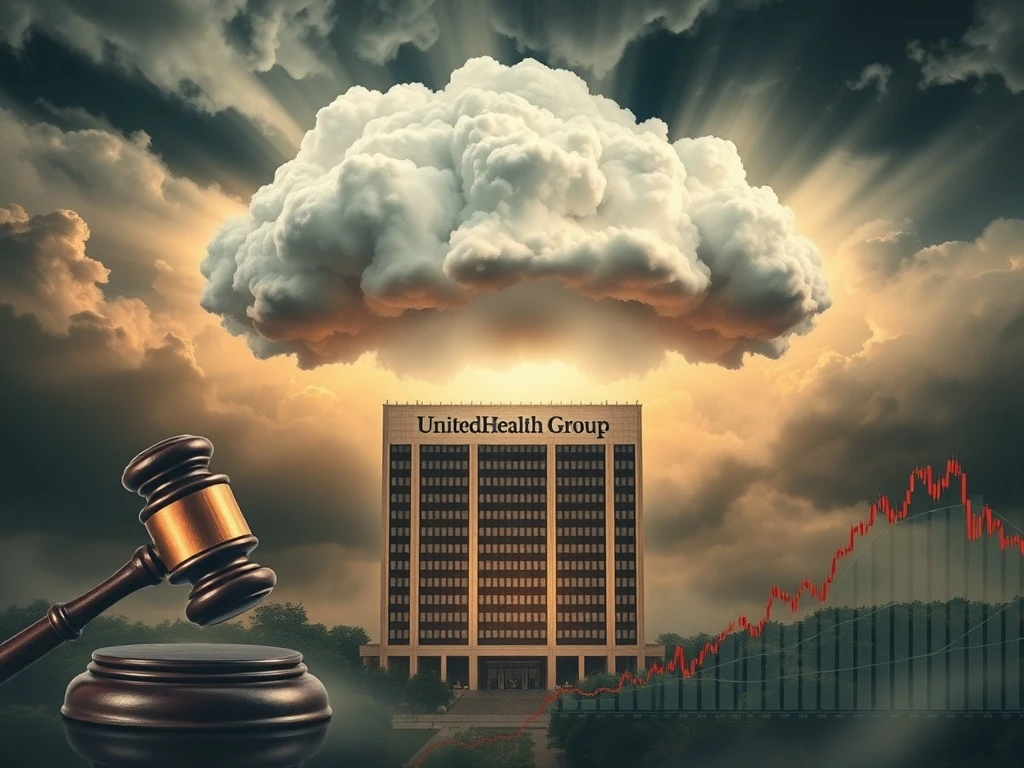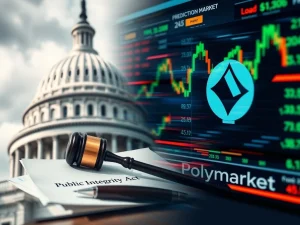Crucial UnitedHealth Group Challenges: Navigating Governance Risks and Market Turmoil

In today’s interconnected financial world, the ripples from one sector’s challenges can spread surprisingly far. Even if your primary focus is on the dynamic world of cryptocurrencies, understanding major market events like those impacting UnitedHealth Group offers crucial insights into broader market dynamics, risk management, and the ever-present shadow of regulatory oversight. After all, governance issues and market volatility aren’t exclusive to traditional finance; they’re universal lessons for any investor. So, let’s dive into the unfolding story of one of America’s healthcare giants and see what lessons it holds for us all.
UnitedHealth Group (UNH), the nation’s largest health insurer, finds itself in a turbulent storm of legal and operational challenges. This isn’t just a corporate hiccup; it’s a significant case study demonstrating how critical governance risks can profoundly impact investor confidence and stock valuation, even for market leaders. The company’s ongoing battles—ranging from criminal to civil investigations into its core Medicare Advantage operations—are sending clear signals across the entire healthcare landscape, reshaping how investors perceive stability and how companies must strategize for compliance.
The Heart of the Matter: UnitedHealth Group Under the Microscope
At the core of the current turmoil facing UnitedHealth Group are dual investigations initiated by the Department of Justice (DOJ) and the Centers for Medicare & Medicaid Services (CMS). These probes are scrutinizing UNH’s Medicare Advantage (MA) billing practices, risk adjustment coding, and broader managed care operations. For those unfamiliar, Medicare Advantage plans receive federal reimbursements based on the health status of their enrolled beneficiaries. The healthier the population, the less money the plan receives, and vice-versa. The controversy stems from allegations that inflated or unverified diagnoses could artificially boost these federal payments, effectively ‘gaming’ the system.
What makes this situation particularly acute for UnitedHealth Group is the proactive outreach from the DOJ, reportedly triggered by media reports. While the company has historically asserted that its coding practices are highly accurate, citing past CMS audits that concluded without findings of wrongdoing, the current investigations are far broader. They involve multiple federal agencies, indicating a significant shift in regulatory posture. The criminal dimension of the inquiry, in particular, elevates the stakes considerably, implying potential breaches of federal law rather than just regulatory non-compliance.
Unpacking the Medicare Advantage Controversy: What’s at Stake?
The Medicare Advantage program, a private alternative to traditional Medicare, has grown exponentially, attracting millions of seniors. Its funding model, based on ‘risk adjustment,’ is designed to provide more funds for sicker patients and less for healthier ones. This is where the contention arises. Critics and regulators allege that some insurers, including UnitedHealth Group, may have engaged in practices that make patients appear sicker on paper than they truly are, leading to higher federal payments. This isn’t just about technicalities; it’s about billions of taxpayer dollars.
Consider these key points regarding the Medicare Advantage controversy:
- Risk Adjustment Mechanics: Plans submit diagnostic codes for beneficiaries. These codes are then used to calculate a ‘risk score,’ which determines the monthly payment the plan receives from the government.
- Allegations of Upcoding: The investigations focus on whether UNH and other MA plans ‘upcoded’ diagnoses—assigning more severe or additional conditions that may not have been fully supported by medical records—to inflate risk scores.
- Financial Impact: Even small adjustments to risk scores across millions of beneficiaries can translate into billions of dollars in federal reimbursements. Improper payments here could lead to massive clawbacks or fines.
- Patient Care vs. Profit: The underlying tension is between ensuring comprehensive patient care and the profit motives of private insurers within a government-funded program.
Why Healthcare Governance is Now a Hot Topic for Investors
For any large corporation, robust healthcare governance is the bedrock of long-term stability and investor trust. For UnitedHealth Group, the current legal maelstrom has put its governance practices squarely in the spotlight. The company’s strategy to mitigate these challenges has centered on a public display of transparency and a reliance on third-party validation. They’ve initiated independent reviews of their risk adjustment coding, pharmacy services, and MA operations—a strategic move aimed at reassuring skeptical stakeholders.
The return of CEO Stephen Hemsley in 2024, after a decade, marked a noticeable shift. Hemsley has publicly acknowledged the need to reevaluate risk adjustment methodologies, a departure from the more defensive posture of his predecessor. However, despite these efforts, skepticism persists. The timing of these legal challenges, coinciding with a tumultuous year for UNH—including a staggering 40% stock price plunge in 2025, leadership instability, and a high-profile executive murder in late 2024—has severely compounded reputational risks. These events raise fundamental questions about the efficacy of healthcare governance and internal controls, even as the company emphasizes its role as a steward of public healthcare resources.
The core question for investors and the public remains: will these measures be enough to restore confidence, or are they merely delaying an inevitable reckoning? The integrity of a company’s governance framework directly correlates with its resilience in the face of adversity.
The Ripple Effect: Analyzing UNH Stock Performance and Market Anxiety
The market’s reaction to UnitedHealth’s predicament has been stark. UNH stock has been one of the most volatile performers in the healthcare sector this year, with shares plummeting over 40% year-to-date. This dramatic decline is a clear reflection of a significant loss of confidence in the company’s governance, exacerbated by rising operational costs and a shrinking profit margin. In Q1 2025, UNH reported a profit margin of 5.8%, noticeably trailing competitors like Cigna and Elevance Health.
Furthermore, the company’s medical loss ratio (MLR) of 84.8% indicates that a substantial 84.8 cents of every premium dollar is being spent on medical costs. This figure underscores the intense financial pressures stemming from rising healthcare inflation. For investors, this situation presents a complex paradox:
| Metric | Q1 2025 (UNH) | Implication |
|---|---|---|
| Stock Performance (YTD) | Down >40% | Loss of investor confidence, high volatility |
| Profit Margin | 5.8% | Trailing competitors, squeezed profitability |
| Medical Loss Ratio (MLR) | 84.8% | High spending on medical costs, impact of inflation |
| Q1 Revenue | $109.6 billion | Strong core business, diversified portfolio |
While UnitedHealth Group boasts a robust core business with $109.6 billion in Q1 revenue and a diversified portfolio spanning insurance, pharmacy benefits, and provider services, the specter of regulatory penalties, lasting reputational damage, and potential restrictions on government contracts has created a highly toxic investment environment. Both Moody’s and S&P downgraded the company’s risk profile in early 2025, specifically citing “heightened uncertainty around compliance and operational resilience.” This clearly shows how intertwined corporate governance is with market perception and financial ratings.
A New Era of Regulatory Scrutiny: What Does it Mean for the Industry?
The challenges faced by UnitedHealth Group are not an isolated incident. They are symptomatic of a broader, intensified wave of regulatory scrutiny sweeping across the entire healthcare industry. Regulators are no longer content with reactive measures; they are adopting a far more aggressive and proactive stance. The HHS Office of Inspector General’s Spring 2025 Semiannual Report offers compelling evidence of this shift, highlighting a staggering $16.6 billion enforcement impact.
Key areas of focus for this heightened regulatory scrutiny include:
- Medicare Advantage Risk Adjustment Fraud: Identified as a massive target, with $7.5 billion in enforcement impact.
- Improper Payment Schemes: Another significant area, accounting for $465 million in enforcement actions.
- Advanced Analytics & AI: Regulators are increasingly leveraging sophisticated data analytics and artificial intelligence to detect anomalies in billing, coding, and payment practices, making it harder for fraudulent activities to go unnoticed.
For investors across all sectors, this signals a profound paradigm shift. Compliance is no longer a mere cost center; it has become a fundamental strategic imperative. Companies that fail to adapt to evolving regulatory expectations—whether it’s by implementing AI-driven payment integrity systems or adopting robust zero-trust cybersecurity frameworks—risk not only hefty fines but also significant competitive disadvantages and erosion of market share. UnitedHealth’s current struggles, therefore, serve as a stark cautionary tale for the entire sector: effective healthcare governance and rigorous compliance are now directly linked to market performance and investor sentiment.
Investment Considerations: Navigating the Uncertainty
For those considering investments in the healthcare sector, or specifically in UNH stock, the path forward is complex and hinges on several critical factors:
- Resolution of Legal Challenges: A favorable outcome in the DOJ investigations could provide a much-needed boost to the stock. However, even a minor settlement could still signal systemic weaknesses that require ongoing attention.
- Leadership and Strategic Reforms: CEO Hemsley’s ability to successfully reorient the company toward a compliance-first culture will be paramount. Investors should closely monitor the results of third-party audits and any concrete adjustments made to risk adjustment practices.
- Sector-Wide Trends: As regulators intensify their scrutiny, companies that already possess robust compliance frameworks—such as Elevance Health or Humana—may gain a significant competitive edge. Conversely, those that lag behind face increasing margin pressures and legal risks.
- Valuation Metrics: As of July 2025, UNH stock is trading at a forward P/E ratio of 12x, representing a discount compared to its historical average. While this might appear as a tempting entry point, it’s crucial to remember that this discount reflects substantial downside risks, including potential fines, operational disruptions, and long-term reputational damage.
Conclusion: A Test of Resilience for a Healthcare Giant
The legal challenges confronting UnitedHealth Group are more than just corporate headlines; they are a microcosm of the broader tensions within the healthcare sector. This situation highlights the ongoing clash between profit-driven business models and the fundamental need for public trust, and between rapid innovation and essential regulatory oversight. For investors, the company’s response to this crisis will serve as a crucial litmus test for its long-term viability and its ability to adapt to a new era of stringent oversight.
While the dramatic decline in UNH stock might present a seemingly attractive entry point for some, the inherent risks associated with governance missteps and potential regulatory penalties remain acutely high. In an industry where proactive compliance is rapidly becoming a key competitive advantage, UnitedHealth Group‘s capacity to navigate this complex crisis will not only determine its own future but also significantly influence the trajectory of healthcare sector investments for years to come. This saga serves as a powerful reminder that robust governance and unwavering ethical practices are non-negotiable pillars of sustainable success in any market.
Frequently Asked Questions (FAQs)
Q1: What are the main legal challenges facing UnitedHealth Group?
UnitedHealth Group is currently under dual investigations by the Department of Justice (DOJ) and the Centers for Medicare & Medicaid Services (CMS). These probes are focused on allegations of inflated billing practices and improper risk adjustment coding within its Medicare Advantage operations, potentially leading to overpayments from the federal government. The investigations include both civil and criminal dimensions.
Q2: How do these investigations impact UnitedHealth Group’s stock (UNH stock)?
The investigations have had a significant negative impact on UNH stock, which has seen a more than 40% decline year-to-date in 2025. This reflects a loss of investor confidence due to concerns about potential fines, reputational damage, and operational disruptions. The uncertainty surrounding the outcomes of these legal challenges contributes to the stock’s volatility.
Q3: What is Medicare Advantage risk adjustment, and why is it controversial?
Medicare Advantage risk adjustment is a system where the government pays private health plans based on the health status (risk score) of their enrolled beneficiaries. The more severe the health conditions reported, the higher the payment. The controversy arises from allegations that some plans, including UnitedHealth Group, may ‘upcode’ diagnoses or assign conditions not fully supported by medical records to artificially inflate these risk scores and secure higher federal reimbursements.
Q4: What role does healthcare governance play in this situation?
Strong healthcare governance is crucial for ensuring ethical practices, compliance with regulations, and maintaining investor trust. In UnitedHealth Group’s case, the investigations highlight potential weaknesses in its internal controls and oversight regarding billing and coding. Effective governance is now seen as a strategic imperative, directly impacting a company’s financial stability and market perception.
Q5: Is UnitedHealth Group the only company facing this type of regulatory scrutiny?
No, the challenges faced by UnitedHealth Group are part of a broader trend of increased regulatory scrutiny across the entire healthcare sector. The HHS Office of Inspector General’s reports indicate a significant rise in enforcement actions related to Medicare Advantage fraud and improper payment schemes, with regulators increasingly using advanced analytics to detect non-compliance.
Q6: What should investors consider when looking at UNH stock now?
Investors should consider several factors: the potential resolution of the legal challenges, the effectiveness of UnitedHealth Group’s leadership in implementing strategic reforms, broader sector-wide trends in regulatory enforcement, and the company’s current valuation metrics. While UNH stock trades at a discount, this reflects significant downside risks that need careful evaluation.









